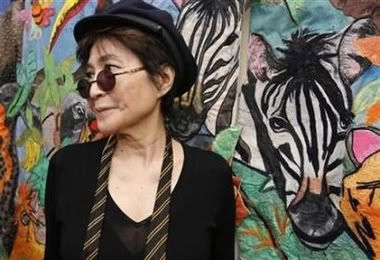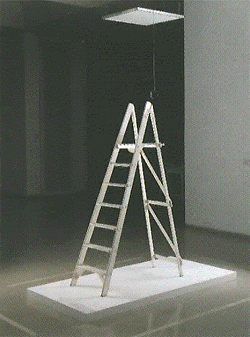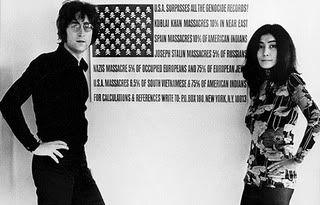
For those of you who might not know, Yoko Ono is an artist, musician, writer, and activist. Her late husband, John Lennon, was a musician and artist in his own right. (HA, SEE WHAT I DID THERE?) Yoko met John in 1966 at an exhibition of her 'conceptual' art work. According to rock/romance legend, at this time Yoko didn't even know who John was. She allegedly didn't recognize him either when he walked into the gallery space where her work was being shown, or when he inquired further about her work.
Yoko and John were a married couple. They were partners, artistic collaborators, and parents together. But both pop music history and pop culture alike have reduced Yoko Ono to a little more than a band-destroying, genius-distracting, performance -ruining' harpy. She is portrayed as the woman who swept into John Lennon's life, alienated his friends and bandmates from him, and thusly robbed the world of the Beatles' collective brilliance.

There are a few issues with this narrative. Yeah, it's blatantly sexist, in the way that it puts the responsibility for the actions of four grown men on one woman. It's also wrong, and completely ridiculous in the way it ignores the reality of what it means to play in a band with people! The hard truth is that the Beatles broke up because of the Beatles. Ten plus years of being so isolated and so famous is enough to wear down anyone, and enough to make anyone sick of the few people who were there. And from what I understand, John Lennon and Paul McCartney went into this whole thing not really like each other all that much.
Being in a band is kind of like being married, in that it involves a serious commitment, constant proximity for all parties involved, and making a lot of major joint decisions. Like marriage, being in a band is a complex bond that is affected by many factors. Like all aspects of marriage, and bandhood, divorce and band break ups are almost always too complex to blame on a single person or event.

We need to face this reality about the Beatles and about bands in general not only for the sake of Yoko Ono, but also for activists and artists. We need to face the reality that collaboration is difficult, and that isn't anyone's fault. Working with other people, talking stuff out, hammering out compromises, and learning to respect people's different ideas and put up with their flaws is really hard. Scapegoating a convenient bystander is the easy way out, and doing so obscures the reality of being a musician as well as Yoko Ono's individual accomplishments.
This does double duty for the capitalist rock machine: it effectively marginalizes a powerful and creative woman, and it also feeds the myth of the Rock Star, aka: a skinny white dude who simultaneously sings and fucks his way across the world and then tells us all about it. The Rock Star and his decadent lifestyle help to sell rock music, so the music industry can't have anyone interfering with this illusion. They don't want the truth of being a working artist (and trust me, it is damned hard work if you're doing it right) getting in the way of the stories they spin to keep the masses entertained and buying cds, concert tickets, and merch.
If us punk feminists really want to challenge this exploitative system, we need to recognize these and other industry methods of exploiting and silencing vocal dissenters and people who don't fit the myth. We need to recognize that all forms of rock are inherently capitalist and patriarchal, being the products of a patriarchal, capitalist system -- and that it's a challenge to this system at the same time (or, it's supposed to be). What makes rock a unique musical tradition is that it's both the system and the fuck you to the system. We have to reclaim that paradox, and make it our own if we're going to make space in music for our voices.
Now that we're on the issue of space, let's bring this back to Yoko, as she is the point of this post.
Back when I was in high school I somehow got to talking about Yoko with my music teacher, Mr. Mora (I've mentioned him before). Himself a fan of the Beatles, Mr. Mora, despite being really smart, had apparently bought into the Yoko myth. He spoke at length about Yoko's notorious performance with John, Keith Richards, Eric Clapton, and Mitch Mitchell on The Rolling Stones Rock'n'Roll Circus.
"She started screaming," Mr. Mora explained, "and you could see the look of disappointment on Eric Clapton's face!" Mr. Mora then proceeded to reenact Eric Clapton's pained expression. (Which, in itself, was priceless, and I wish I had a photo of that to share, but alas, I do not.)
What I do have is a video of this performance. Skip to the end to see Yoko's part and The Face.
What's happening in this video? Watch, and try to not see four of the most famous men in rock history. It's a band of four British brahs playing a song about how one of these wealthy, British, rock star, brahs is just so depressed and wants to die. It's four white guys continuing the tradition of Anglo co-optation of rhythm and blues. (In John Lennon's defense, he allegedly admitted to being self-conscious about this.)
Yoko gets on stage and she starts making weird sounds. Why? To disrupt this sausage and wank fest. To make her voice heard. To make herself, a feminist, peace activist, immigrant woman visible against a background of upperclasswhitedudeness. Yoko is doing more than making strange, uncomfortable noises with her voice. She's using the sound of her voice to queer the entire situation.
I wish Mr. Mora were here so I could tell him all of this, and suggest to him that maybe Yoko's awful voice is the butt of a lot of jokes because deep down, people realize that Yoko's disruption was a significant challenge to the pop-rock, cock-rock oriented music industry. Who knows -- maybe John Lennon got that, about both that moment and Yoko herself, and maybe after years of churning out hit after hit and hook after hook and ear-pleasing melody after melody, even he wanted to express something different, and maybe he thought Yoko was the creative partner who could help him do that.
I would like to think that Mr. Mora would respond to these suggestions by saying "Why, I never thought of it that way!" (No one accepted differing opinions as graciously as Mr. Mora.) I would like to think that Mr. Mora would get that Yoko Ono was not some crazy, screaming, scheming, using harbinger of band doom, but an artist, activist, woman, mother and survivor who married into the rock and roll boys club and then made herself heard -- just as any true feminist punk heroine would.
*The ideas in this post are largely influenced by the work of rock sociologist Simon Frith, pioneer of the rock as paradox theory, and rock and gender media analyst Marion Leonard. Check them out, their stuff is tight.
2 comments:
This rules!
Thanks, chica! I try!
Post a Comment